Creating dementia-friendly meals doesn’t have to be overwhelming. Focus on simple one-pot recipes, use pre-cut ingredients, and incorporate brain-healthy foods like fatty fish and berries. Set up a clutter-free kitchen with labeled cabinets and safety devices like stove guards. Involve your loved one in appropriate tasks like stirring or measuring to maintain skills and dignity. Regular meal planning and batch cooking will save you valuable time while ensuring proper nutrition continues.
Creating a Dementia-Friendly Kitchen Environment
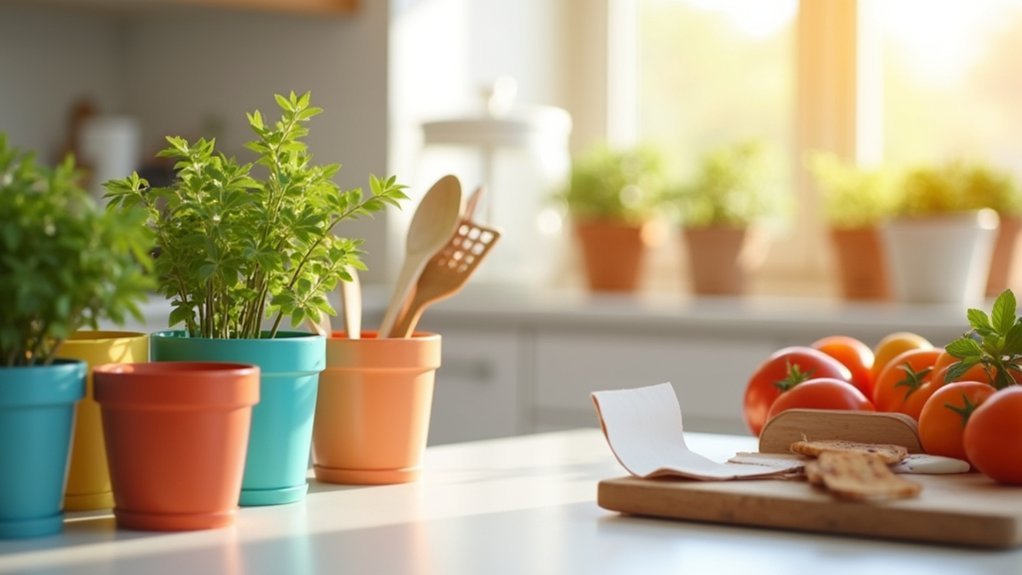
While caring for someone with dementia presents many challenges, transforming the kitchen into a safe, navigable space can greatly reduce stress for both caregivers and their loved ones.
Start by decluttering countertops and organizing essential tools in easily accessible storage. Consider minimizing options and storing away non-essential items that might create confusion or clutter. Install safety devices like stove guards and cabinet locks to prevent accidents.
A clutter-free kitchen with strategically stored tools and proper safety devices creates a secure environment for dementia patients.
Verify your kitchen has adequate, even lighting to improve visibility and reduce confusion. Label cabinets and appliances with large, clear text or pictures to help your loved one identify items.
Maintain a consistent layout—don’t rearrange furniture or move frequently used items. Use contrasting colors for important objects to make them stand out.
Break down cooking tasks into simple steps and establish regular routines to create a sense of familiarity and confidence in the kitchen.
Nutritional Essentials for Brain Health
You’ll want to incorporate brain-boosting superfoods rich in omega-3s, antioxidants, and essential nutrients like choline and B vitamins that support cognitive function.
Stock your pantry with quick options such as nuts, canned fish, and frozen berries that offer nutritional benefits without lengthy preparation.
Choose foods from traditional diets like Mediterranean or Japanese cuisine, which have been linked to a significantly lower risk of depression and better brain health compared to Western dietary patterns.
These smart food choices can help maintain brain health while fitting into your busy caregiving schedule.
Brain-Boosting Superfoods
As dementia progresses, proper nutrition becomes increasingly essential for maintaining cognitive function. You’ll want to incorporate these powerful superfoods into your loved one’s meals to support brain health.
Focus on leafy greens like kale and spinach, which provide vitamin K and folate that enhance cognitive function. Include fatty fish such as salmon, rich in omega-3s that reduce beta-amyloid buildup. Berries deliver memory-enhancing flavonoids, while nuts and avocados offer healthy fats. Research shows that consuming tea and coffee regularly can help improve memory retention and mental function.
| Superfood | Brain Benefit |
|---|---|
| Leafy Greens | Rich in folate and vitamin K |
| Fatty Fish | Provides omega-3 fatty acids |
| Berries | Contains memory-boosting flavonoids |
| Nuts & Seeds | Delivers vitamin E and antioxidants |
Following Mediterranean or MIND diet principles can reduce dementia risk by up to 23% according to research.
Easy Meal Shortcuts
Caregiving demands often leave little time for elaborate meal preparation, even when you understand the importance of brain-boosting foods.
Fortunately, you can maintain nutritional quality without sacrificing your valuable time.
Try meal kit delivery services that provide pre-portioned ingredients for quick assembly. Batch cooking on weekends can stock your freezer with single-portion meals for easy reheating. Semi-prepared foods like pre-cut vegetables and cooked grains considerably reduce prep time while preserving nutrients. Consider incorporating dishes featuring quinoa in your meal rotation, as this whole grain supports brain health while offering quick preparation times.
For simplicity, incorporate finger foods such as cheese cubes, sliced fruits, and mini sandwiches that require minimal utensils.
Smoothies blending leafy greens, berries, and protein powder offer concentrated nutrition in minutes. Supplement with easy-to-eat options like yogurt with honey or apple slices with almond butter to boost caloric intake throughout the day.
One-Pot Meal Solutions for Simplified Cooking
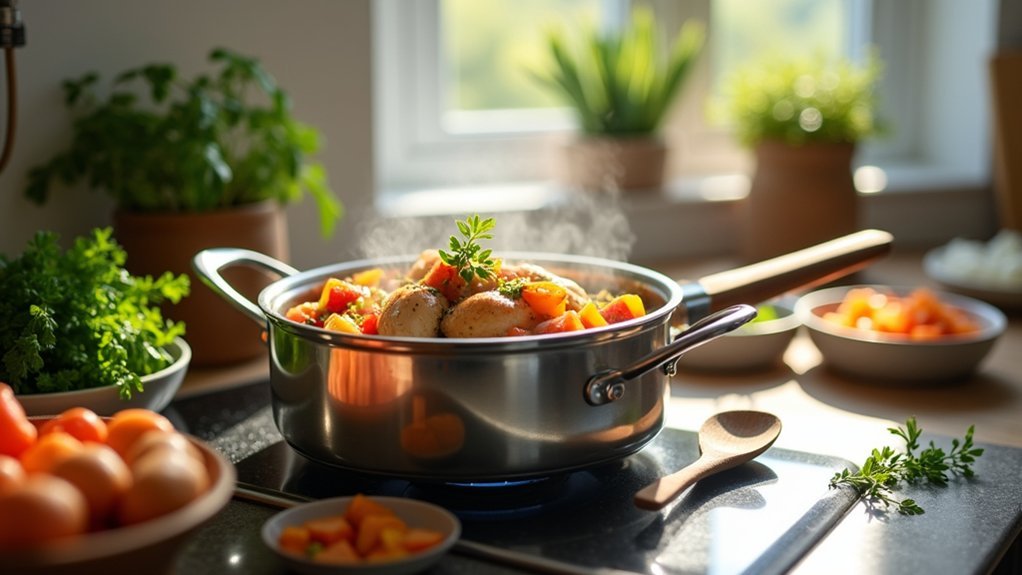
One-pot meals offer you valuable time-saving benefits through batch cooking, allowing preparation of multiple nutritious meals while minimizing supervision time at the stove.
You’ll reduce kitchen hazards by limiting the number of appliances in use simultaneously, creating a safer environment for someone with dementia. Using contrasting colored plates when serving these one-pot meals can increase food consumption for seniors with dementia.
Nutritious one-pot recipes combine proteins like chicken with vegetables such as Brussels sprouts, delivering complete meals that maintain health while simplifying your caregiving routine.
Batch Cooking Benefits
For many dementia caregivers, simplified meal preparation becomes essential in managing daily responsibilities while maintaining nutritional quality. Batch cooking can transform your caregiving routine by saving precious time and reducing daily cooking stress. One-pot meals are particularly beneficial as they provide complete nutrition while minimizing the number of dishes and steps required in preparation.
| Benefit | How It Helps You |
|---|---|
| Time Efficiency | Cook once, eat multiple times – freeing up your schedule for other caregiving needs |
| Nutritional Control | Customize meals for specific dietary requirements while ensuring variety |
| Reduced Stress | Eliminate daily “what’s for dinner” decisions when fatigue sets in |
| Enhanced Independence | Include your loved one in simple prep tasks that provide meaningful engagement |
Minimizing Kitchen Hazards
Creating a safe kitchen environment stands as a critical priority when caring for someone with dementia. Install stove knob covers and automatic shut-off devices on appliances to prevent accidental fires. Store sharp objects, toxic substances, and potentially dangerous items securely out of reach.
Ensure your kitchen is well-lit with non-slip mats near sinks and work areas. Use contrasting colors to help distinguish between surfaces and objects. Clear countertops of unnecessary items and maintain organized storage with labeled cabinets and drawers. Using a microwave oven can be a safer alternative that simplifies cooking and reheating food.
Consider implementing adaptive utensils that are easier to handle and establish consistent routines for kitchen activities. Visual cues and simple signage can guide someone with dementia through basic kitchen procedures, reducing confusion and promoting independence while maintaining safety.
Nutritious One-Pot Recipes
Nutritious one-pot meals offer caregivers a practical solution to the daily challenge of providing balanced nutrition while managing dementia care responsibilities.
Options like rice and beans, salmon stir-fry, chicken soup, lentil stew, and one-pot pasta deliver essential nutrients while minimizing prep time and cleanup. These dishes support both brain and gut health through omega-3 fatty acids, antioxidants, fiber, and protein. Roasting and baking require less hands-on time, making them ideal techniques for busy caregivers.
Using time-saving tools like Instant Pots or slow cookers can further reduce your cooking burden. Most recipes take under 30 minutes to prepare and many can be frozen for future meals.
Consider serving these nutritious options on colorful plates to stimulate appetite, and vary textures to maintain mealtime interest.
These simplified cooking strategies help reduce your stress while ensuring both you and your loved one receive proper nourishment.
Engaging Cooking Activities That Preserve Motor Skills
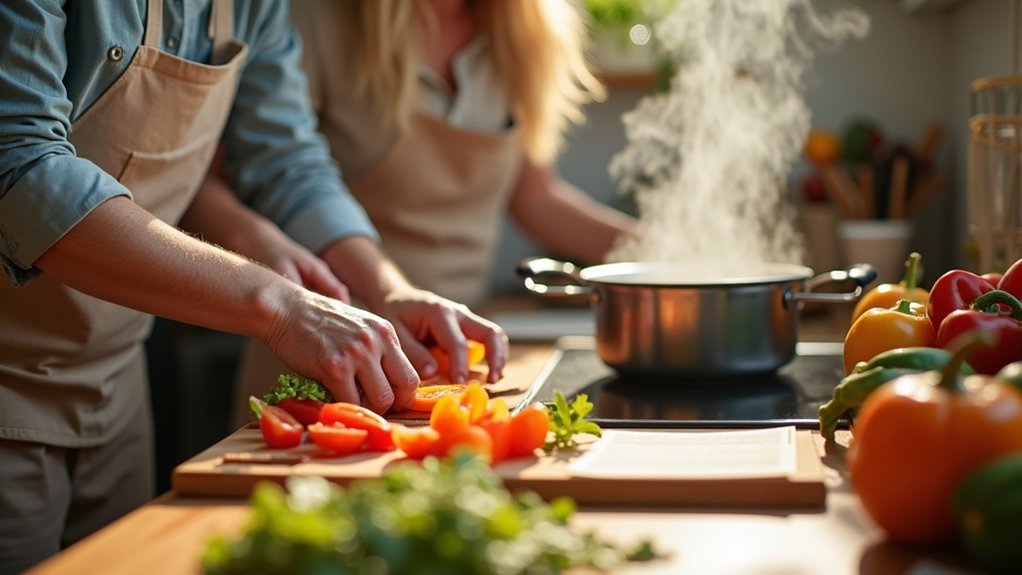
When caring for someone with dementia, simple cooking activities can work wonders for maintaining motor skills. Cooking engages multiple senses while providing therapeutic benefits that help preserve dexterity and cognitive function.
You’ll notice that even basic kitchen tasks offer meaningful engagement while creating opportunities for success and accomplishment.
- Ask your loved one to stir batter or knead dough—these repetitive motions are calming while improving hand coordination.
- Invite them to sprinkle herbs or spices onto dishes, which requires precision and control.
- Encourage measuring ingredients, which helps maintain cognitive sequencing abilities.
- Let them feel different food textures like smooth dough or rough grains for sensory stimulation.
- Create simple assembly tasks like arranging fruit on yogurt or toppings on pizza.
These activities tap into procedural memory, which typically remains accessible longer than other types of memory in people with dementia.
Safety First: Adapting Kitchen Tools and Appliances
Safety in the kitchen becomes paramount as dementia progresses, requiring thoughtful adaptations to tools and appliances.
Install automatic shut-off devices for stoves and use knob covers to prevent accidental activation. Consider investing in an Automatic Stove/Oven Control that monitors activity and automatically shuts off when the kitchen is empty. These simple modifications can prevent dangerous situations before they occur.
Choose appliances with intuitive interfaces and consider voice-controlled options that eliminate complex buttons.
Opt for lightweight pots and utensils with ergonomic handles to reduce strain and improve grip.
Place non-slip mats near work areas to prevent falls.
Color-code kitchen tools and label cabinets with large, clear text for easy identification.
Always unplug small appliances when not in use and maintain clear pathways throughout the kitchen.
These adjustments allow your loved one to maintain independence while ensuring their safety.
Managing Mealtime Challenges and Food Preferences
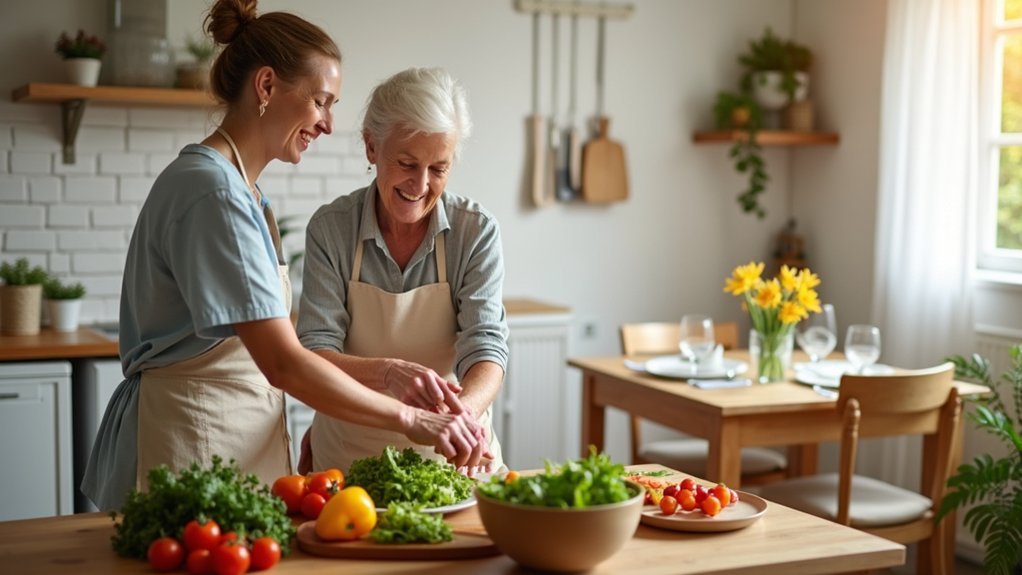
When your loved one refuses food, gently offer alternatives or try again later rather than creating mealtime tension.
Transform familiar favorites into dementia-friendly versions by simplifying recipes while maintaining recognizable flavors and appearance.
You’ll find more success by serving nutrient-dense foods with textures appropriate to their abilities and presenting meals on contrasting plates that help them distinguish the food clearly. Older adults with dementia commonly experience difficulties with picking up food, chewing, and swallowing, which can significantly impact their nutritional intake.
Redirecting Food Refusals
Nearly half of all dementia patients develop food intake difficulties within eight years of diagnosis, creating significant challenges for caregivers. When your loved one refuses food, try redirecting rather than confronting.
Create a calm environment with appropriate lighting and minimal noise to reduce distractions and stress during mealtimes.
- Offer choices between two options to maintain dignity and encourage decision-making
- Use visual cues by showing food rather than just verbally describing it
- Serve smaller, more frequent meals with nutrient-dense ingredients
- Maintain consistent mealtime routines to reduce anxiety and confusion
- Consider texture modifications for those with chewing or swallowing difficulties
Remember that food refusal often stems from sensory issues, confusion, or physical discomfort rather than stubbornness.
Using appealing colors and aromas can help stimulate interest in eating for those with diminished appetite.
Patience and flexibility are key to successful mealtimes.
Adapting Familiar Favorites
How can familiar foods bring comfort to someone whose world is constantly changing? For many with dementia, favorite dishes can trigger positive memories even when food preferences shift.
You’ll notice these changes vary by dementia type—FTD often brings increased appetite and sweet cravings, while Alzheimer’s may reduce appetite.
Enhance familiar recipes with stronger spices to compensate for diminished taste and smell. If your loved one suddenly prefers sweeter foods, incorporate healthier sweet options into balanced meals. Offering fruits, naturally sweet vegetables, and adding herbs and sauces can help make meals more appealing while maintaining nutritional value.
Consider texture modifications for easier eating while maintaining recognizable flavors. Serve smaller portions more frequently if appetite fluctuates, and create a calm mealtime environment free from distractions.
When possible, involve your loved one in simple meal planning to maintain their sense of choice and independence.
Therapeutic Cooking: Activities That Reduce Agitation
Individuals with dementia often experience periods of agitation and restlessness that can be challenging for both them and their caregivers. Engaging your loved one in therapeutic cooking activities can greatly reduce these behaviors while providing cognitive stimulation and a sense of purpose.
Research shows cooking interventions decrease apathy and improve overall mental health by maintaining familiar roles.
- Try simple kneading activities like making bread dough to improve dexterity and relieve stress.
- Use familiar recipes that connect to personal history to enhance feelings of self-worth.
- Create a structured, safe environment with minimal distractions during cooking sessions.
- Incorporate stirring tasks that require repetitive motion to promote calm and focus.
- Encourage group participation when possible to maximize social benefits and teamwork.
Many therapists recommend matching cooking tasks to the functioning levels of individuals with dementia to ensure success and prevent frustration.
Weekly Meal Planning for Caregivers
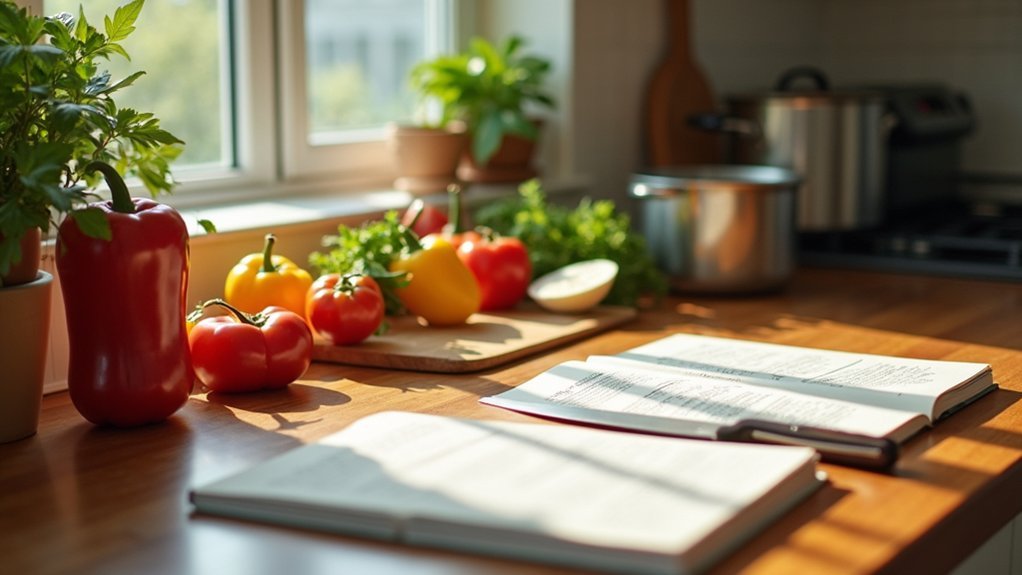
Effective meal planning can transform the caregiving experience by reducing daily stress and guaranteeing proper nutrition for your loved one with dementia.
A well-organized meal plan eases caregiver burden while ensuring loved ones with dementia receive essential nutrition.
Start by creating a weekly template that includes balanced meals with various fruits, vegetables, proteins, and grains.
Consider batch cooking on weekends when you might’ve more time and energy. Prepare large portions of favorite dishes that can be frozen in individual servings for easy reheating.
Digital meal planning apps can help organize your weekly menu and shopping lists.
Don’t hesitate to repeat successful meals regularly—consistency is comforting for people with dementia.
Remember to adapt your plans based on your loved one’s changing needs, preferences, and health conditions. Use contrasting colors when plating meals to help your loved one distinguish food items more easily, improving their eating experience.
Consult with a nutritionist to guarantee you’re addressing specific dietary requirements while maintaining flexibility in your approach.
Social Cooking: Involving Your Loved One Appropriately
Cooking together creates powerful opportunities for connection with your loved one who’s dementia, transforming a daily necessity into meaningful engagement.
Match tasks to their abilities by evaluating their cognitive function and physical limitations. Prepare your kitchen in advance by organizing ingredients and simplifying your workspace to reduce confusion.
- Select familiar recipes that evoke positive memories and stimulate conversation
- Assign straightforward tasks like stirring, measuring, or arranging ingredients on a plate
- Create a calm environment by minimizing distractions and background noise
- Use simple, clear instructions and demonstrate steps when needed
- Focus on the sensory experience—encourage smelling spices, feeling textures, and tasting ingredients
Setting up multiple timers for different cooking stages can help maintain structure during your cooking activity together. Always prioritize safety while fostering independence and celebrating their contributions, no matter how small.
Adapting Family Recipes for Cognitive Limitations
Family recipes contain treasured memories and can be powerful tools in dementia care, but they often need thoughtful adaptation to match your loved one’s changing abilities.
Start by simplifying complex recipes, reducing the number of ingredients and steps while preserving familiar flavors and aromas.
Create visual recipe cards with clear pictures of ingredients and step-by-step instructions. Use large-print labels on storage containers to help with identification.
Break down multi-step processes into manageable tasks that won’t overwhelm. Occupational therapists note that addressing cognitive deficits in meal-related tasks is crucial for maintaining independence.
Consider texture modifications for safety while maintaining taste profiles your loved one recognizes. Family favorites might need adjustment—perhaps grandmother’s complex pie becomes a simpler cobbler with the same fruit filling.
The goal isn’t perfection but preserving meaningful connections through familiar tastes and cooking traditions.
Time-Saving Techniques for Busy Caregivers
While caring for someone with dementia demands significant time and energy, implementing strategic cooking techniques can dramatically reduce your kitchen workload.
Batch cooking and using convenient tools will free up valuable time you can redirect to care activities or self-care.
- Prepare large quantities of protein-based meals in advance, portion them individually, and freeze for quick reheating.
- Utilize slow cookers for “set it and forget it” meals that tenderize meats while you attend to other responsibilities.
- Choose one-pot recipes like stews or pasta dishes to minimize cleanup time and complexity.
- Pre-wash and pre-chop vegetables during less hectic moments for easy meal assembly later.
- Organize your kitchen storage so frequently used items are easily accessible, reducing prep time.
The COVID-19 quarantine has forced many caregivers to spend increased time in the kitchen while still managing their caregiving duties.
Frequently Asked Questions
How Do I Handle Food Hoarding Behaviors in Dementia Patients?
You’ll need to approach food hoarding compassionately. Guarantee food safety by checking expiration dates regularly, provide secure storage for non-perishables, and gradually reduce excessive stockpiles while respecting the patient’s need for security.
When Should Cooking Activities Be Completely Discontinued for Safety Reasons?
You should discontinue cooking activities when you observe consistent forgetting of stove use, inability to follow basic steps, frequent safety incidents, declining physical capabilities, or when the person can’t recognize kitchen hazards despite implemented safety measures.
Can Specialized Dishware Improve Eating Habits for Dementia Patients?
Yes, specialized dishware can improve your loved one’s eating habits. Blue or red plates can increase food intake by highlighting food contrast, while adaptive features like non-slip surfaces and easy-grip handles address common eating challenges.
How Do Medication Schedules Affect Meal Timing and Nutrition?
Medication schedules greatly impact when you’ll plan meals and what nutrients your loved one receives. You’ll need to coordinate timing carefully as some medications require food, while others work best on an empty stomach.
What Strategies Help When a Person With Dementia Refuses to Eat?
When your loved one refuses to eat, try offering favorite foods, creating a calm environment, using colorful plates, providing finger foods, and never forcing them. You’ll find patience and a relaxed approach works best.
In Summary
Remember, you’re not just cooking—you’re nourishing both body and spirit. By implementing these simple strategies, you’ll create safer, more enjoyable food experiences while reducing your caregiver stress. Start with one change at a time, and you’ll soon find a rhythm that works for both of you. The journey with dementia isn’t easy, but meaningful food moments can still bring comfort and connection.

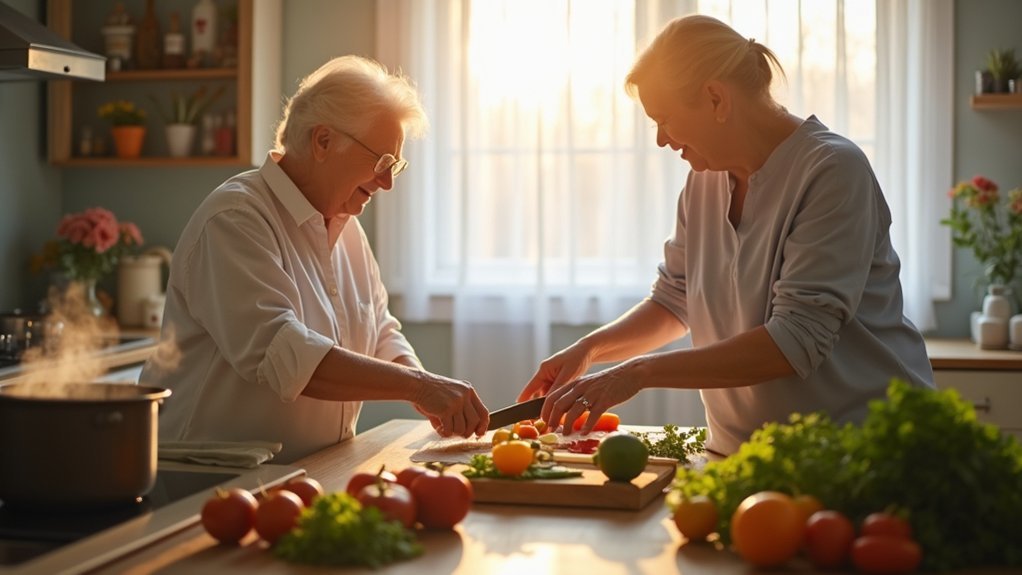
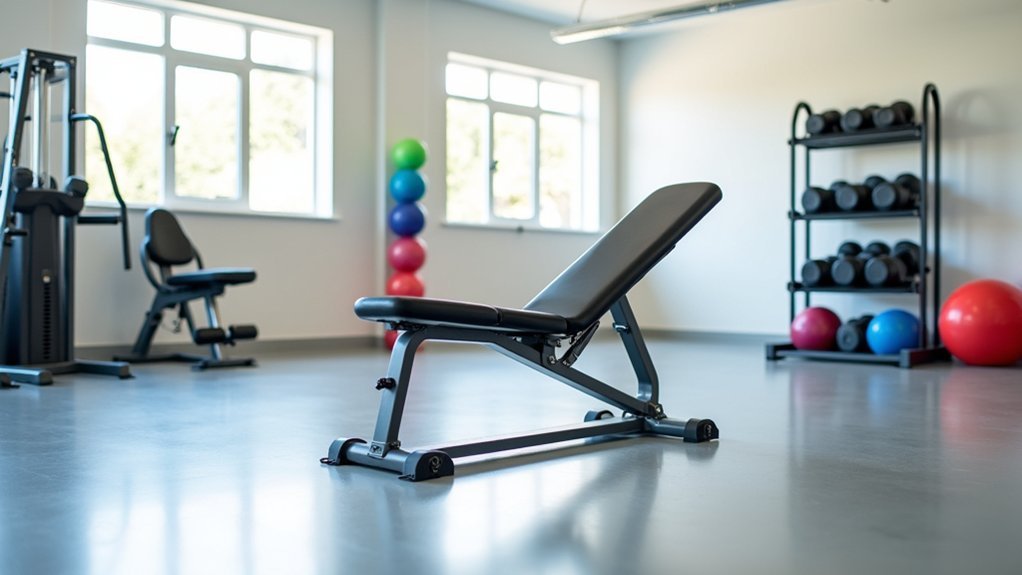
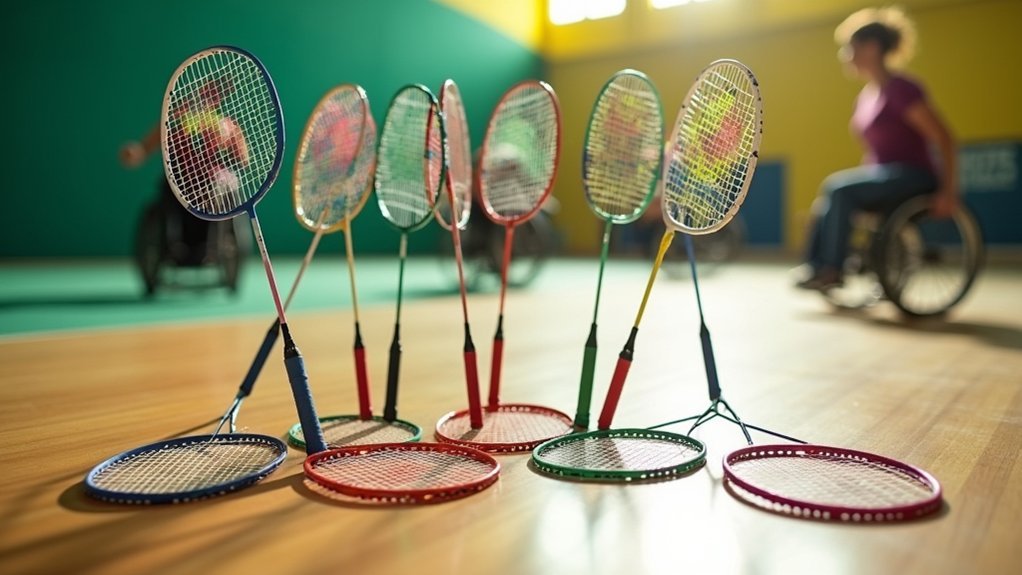

Leave a Reply